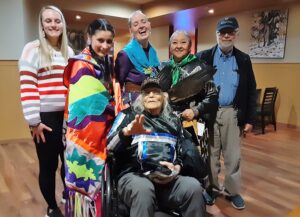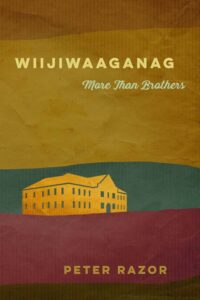Wiijiwaaganag: More Than Brothers

James Peter Razor-ba, known professionally as Peter Razor, was born December 25, 1928 in St. Paul, Minnesota. He changed worlds on May 30, 2022 at the age of 93. He was an enrolled member of Fond du Lac Band of Lake Superior Chippewa (Nagaajiwanaang) and decorated Army veteran of the Korean War.
James was honored at the Iskigamizige-Giizis: Maple Sugar Moon Pow Wow in April of 2022 at the Black Bear Otter Creek Event Center in Nagaajiwanaang. He asked friends Margaret Noodin and Janis Fairbanks to dance with him to celebrate his life and the completion of his three novels for younger readers. Margaret’s daughter, Fionnan also joined them along with Janis’ husband Kazimierz Roterman and Ojibwe language teacher, Angela Mesic.
James’s writing career began in 2001 when he wrote his award-winning memoir, While the Locust Slept, chronicling his time at Owatonna State School and subsequent experiences under farm indenture. He returned to writing in his final years when he decided to offer stories of Anishinaabe and American history featuring younger protagonists. Wiijiwaaganag: More Than Brothers, the first of these stories, was published in the fall of 2022.
 In the book, James uses historical fiction to imagine settlers who became friends with Anishinaabe people and a world where Ojibwe language and culture thrived in the new nation being formed. He told editor, Margaret Noodin, he wanted the Anishinaabe characters to speak their language and together they worked to ensure the book was a contribution to the revitalization of Ojibwe. Several members of his family, and Margaret’s partner Michael Zimmerman Jr. were part of the team who brought the book to life.
In the book, James uses historical fiction to imagine settlers who became friends with Anishinaabe people and a world where Ojibwe language and culture thrived in the new nation being formed. He told editor, Margaret Noodin, he wanted the Anishinaabe characters to speak their language and together they worked to ensure the book was a contribution to the revitalization of Ojibwe. Several members of his family, and Margaret’s partner Michael Zimmerman Jr. were part of the team who brought the book to life.
The Ojibwe language in the book is translated by the narrator so the reader does not lose any content. For example a reader might find the line: “Nizh Eshkanag said he hadn’t wanted to worry her and Migizi. ‘Gaawiin nigii-misawendanziin babaamenimiyeg giin miinawaa noos.'” This helps learners practice their Ojibwe while also testing their translation skills. A glossary with all Ojibwe words used in the book is included for ambitious readers who want to work on learning and then using the words on their own.
Here are four sections of the book excerpted as short scenes to show the significance and power of characters using their mother language:
Scene 1 (pp. 13-14)
The scene is the new home in Waaban where Migizi and his wife Bizann have moved so their son Niizh Eshkaanag will be able to attend a boarding school that has a slightly better reputation than his current boarding school.
Migizi: “Indoshkiwiigiwaaminaan.” (Our new wigwam)
Bizaan: “Gegapii! Ginitaa-ozhitoon. Gonemaa gida-miigwechiwi’in apii gisinag
biboong.” (Finally! You built it well. I will be thanking you for that during the cold winter.)
Migizi: “Anooj da-ozhichigaade, Bebooniked gaawiin wii-nayendaagozisii biinjaya’iing.” (It was work but Winter Maker won’t be settling inside here.)
Niizh Eshkanag: “Nigii-wiidokaagoo epiichi ozhitooyaan ishkodekaan.” (I helped build the fire place.)
Migizi: “Gegaa debwe. Niizh ogii-wiidokawaan Bizhiwan miinawaa Esibanan.” (He’s almost right. Niizh helped Bizhiw and Esiban.)
Niizh Eshkanag: “Enh, debwemigad gaye baatayiinowag bi-endaajig gii-wiidokoonangwaa.” (Yes, that’s true, many of those living here helped us.)
Bizaan: “Gigichimiigwechiwi’in. Nimbagosendaan Niizh wii-minwendang oshki-gikinoo’amaadiiwigamig.” (Thank you both. I hope Niizh will like his new school.)
Everyone moves outside, and Migizi waved at an approaching family: Bizhiw, his wife, Ziigwan, and their son, Esiban.
Migizi: “Esiban, nandawaabam Niizh bebezhigooganzhiin dakonaad.” (Look at Niizh holding his horse.)
Niizh Eshkanag: “Ho, Esiban.”
Bizhiw: “Bebezhigooganzhii niwii-dakonaa.” (I’ll take the horse.)
The two young friends run off to play.
Scene 2 (pp. 15 – 16)
Two mothers reflect on their sons’ experiences in boarding school.
Ziigwan: “Gekino’amaagejig aakwaadiziwag Poleville-ing.” (The teachers at Poleville Indian School are strict.)
Bizaan: “Ogiichigonaawaan ina abinoojiinyan?” (Did they forcibly take the children?)
Ziigwan: “Moozhag ogagwe-zegi’aawaan.” (Usually they threaten them.)
Bizaan: “Gekinoo’amaagejig ina miinawaa wenokiijig owiisagenimaawaan?” (Do the teachers and workers hurt them?)
Ziigwan: “Naasaab dibaakonigewinan odebwe’endaanaanaawaa. Esiban ingii-wiindamaag aanind aakwaadiziwaad miinawaa aanind minwaadiziwaad.” (They believe the same laws we do. Esiban told me some of them are cruel and some are kind.)
Bizaan: “Chimewinzha abinoojiiyan gaawiin obakite’aasiiwaan Anishinaabeg.” (Long ago Anishinaabe people did not hit their children.)
Ziigwan: “Niizh chigikendaaso miinawaa daa-nandagikendang ingodwaaso-biboonan giishpin andawendang. Gaawiin bagidinigosiiwag wii-biidoowaad gegoon ji-mikwendamowaad Anishinaabe izhitwaawinan.” (Niizh is smart and should study more than six years if he chooses. The boys aren’t able to bring enough to remember Anishinaabe traditions.)
Bizaan: “Owii-agindaanaawaa Gichi-mookomaan-mazina’iganan aanwi gaawiin wiikaa wanendanzigwaa gaa-gikinoo’amaagoziwaad wayeshkag Gichi-mishomis maadaajimod.” (They will learn from American books but they will not forget the lessons of the First Grandfather.)
Scene 3 (pp 67-68)
Two boys speaking in their room at boarding school.
Esiban: “Aapideg biizikonayen.” (You need to get dressed.)
Niizh Eshkanag: “Miigwech. Soon it is Strawberry Moon. Ode’imini-giizis sounds better than June to me.”
Esiban: “Gaawiin indamanegiimiisiimin. Gichi-ayaayag neyaab gib- izhigonaanig endaayang.” (We no longer need to escape. The elders will come back to take us home.)
Niizh Eshkanag: “Niwii-gagaanwaanikwe miinwaa biizikamang waawaashkeshiwegin gaye makizinan.” (I will let my hair grow and wear deerskin and moccasins.)
Esiban: “Mikwendan ina? Remember? The agent wishes everyone to wear white man’s clothes, even in our own villages.”
Niizh Eshkanag: “Nayaazh ishkwaaj ingii-noondawaag ingitizimag gaye apikaadizoyaan.” (I want to hear my parents and have my hair braided.)
Esiban: “Nigiiwemin wayiiba.” (We will go home soon.)
Niizh Eshkanag: “Chi-zanagad bangii eta ji-baabaabii’oyang.” (I have big difficulty waiting a little time.)
Scene 4 (pp 166 – 168)
Niizh Eshkanag and his friend Giigoo are in pursuit of two trappers who have kidnapped Roger.
Giigoo: “Howah!” (Hey!)
Niizh Eshkanag: “Roger ogii-bi anweshimo; ininiwag abiwaad imaa. Gaawiin ogii-mamaajiisii iidog dash daa-wiisagishing! Daa-zegindaagwad aanawi giishpin bezhigwendaman, daa-zhaagoozikamawangwaa ishpaadinaang gaye gemaa zhaabwizhang Roger.” (Roger rested here; the men sat there. He wasn’t able to move and might have been in pain! It could be dangerous, but if we think as one we can get ahead of them and save Roger.)
Giigoo: “Gaawiin nizegizisii, aaniish dash waa-ezhi-doodamang ge gwiiwizensiwiyang . . . gagwe-bakinawangwaa niizh gegiitaawendangig ayaawaawaad bebezhigoogaanzhiin gaye baashkiziganan?” (I’m not afraid but how do we do this as we are boys . . . try to defeat two clever ones who are on horses and have guns?)
Niizh Eshkanag: “Gegoo indenendaan . . . Gidaa-gizhiibizomin biinish gabikawangwaa. “Gaawiin gidaa-nishi’aasiinaanig biinish giinawind naniizaaniziyang. Gichi-mookomaanag apane gimaji-dibaa konigonaanig Anishinaabeg.” (I am thinking of something. . . We should speed up and pass them. We should not kill anyone unless we are threatened because the Americans always rule against the Anishinaabe people.)
Giigoo: “Awiya ayaa!” (Someone is here!)
Niizh Eshkanag: “Wanii’igewininiwag! Moozhag anwaatin mitigwaking. Bebezhigoogaanzhig nitaa-minaanjigewag, geyaabi dash bakaan ezhichigewaangwen, gegoo noos gii-dibaajimid.” (The trappers! It’s usually calm in the woods. Horses have a good sense of smell, still I want to do something from a story my father told me.)
And the boys set out to save their friend. . .
